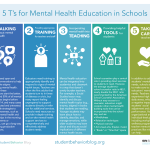Table of contents
Tips for Teaching Children About Mental Health and Self-Care
The importance of teaching children about mental health and self-care cannot be overstated. Mental health and self-care skills are essential for ensuring that children lead healthy, thriving lives. While mental health and self-care skills can be difficult to teach, there are some tips for teaching children about these two topics.
Explain What Mental Health and Self-Care Are
Children may not know what mental health and self-care are, even if they’ve heard them mentioned. It is important to explain mental health and self-care to children in a straightforward, age-appropriate manner. Explain to them that mental health is a person’s psychological, emotional and social foundation for health and well-being, and that mental health can affect how a person behaves, interacts with others and feels about themselves. Talk to children about self-care, including activities such as exercising, drinking water, eating healthy foods and getting plenty of rest.
Roleplay Problem-Solving Scenarios
Incorporating roleplay into conversations and activities is a great way to teach children about mental health and self-care. Roleplay activities can help children learn problem-solving skills and apply them to real-life situations. For example, you can roleplay a situation in which one person is exhibiting signs of stress and the other person has to talk to them and offer solutions. Doing this kind of activity helps children learn creative problem-solving skills and can help them respond better in situations when they’re feeling overwhelmed.
Encourage Healthy Communication
When teaching children about mental health and self-care, it is important to emphasize the importance of healthy communication. Communication is a key part of maintaining healthy relationships and managing stress. Stressful situations can make it hard to think clearly and communicate effectively, so it’s important for children to learn strategies for communicating in a healthy way.
Teach Children Coping Strategies
When children experience difficult situations or stressful emotions, it can be hard for them to cope. Teaching children coping strategies can help them manage their emotions and communicate in healthier ways. Some strategies for teaching children coping skills include:
- Teaching children to be aware of warning signs of stress.
- Encouraging children to take breaks and practice deep breathing exercises.
- Encouraging children to exercise regularly and eat nutritious foods.
- Practicing positive self-talk with children.
- Talking to children about the importance of building and nurturing supportive relationships.
- Teaching children about the importance of self-care and relaxation techniques.
Create Opportunities to Talk Openly About Mental Health and Self-Care
Creating open conversations and spaces to talk about mental health and self-care can help to make children more comfortable talking about these topics. Talking openly with children can help them process their emotions and understand that mental health and self-care are important topics. It is also important to be a role model for mental health self-care for children.
Conclusion
Teaching children about mental health and self-care is an essential part of helping them foster positive mental health. By creating open conversations, roleplaying scenarios and teaching coping strategies, children can learn essential skills to manage stress and take care of their mental health. Following these tips will help ensure that children have the skills necessary to lead healthy, thriving lives.







